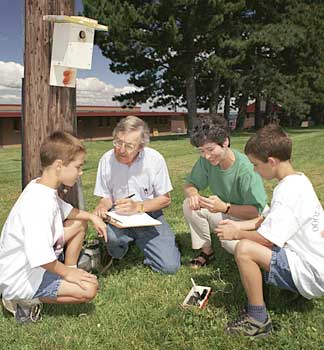Conservationist and educator Richard B. Fischer is dead at 86
By H. Roger Segelken

Richard B. Fischer, a Cornell University professor emeritus of environmental education who instilled in students a deep appreciation for the natural world during 32 years of teaching and then continued to lead Cornell Adult University tours after his retirement in 1985, died at his Ithaca home Aug. 7. He was 86.
Fischer's outspoken advocacy for returnable beverage container legislation in the 1970s and 1980s made the state's highways a cleaner place, while his habitat restoration work for migrating birds, especially the Eastern bluebird, helped return diversity to the byways. Through his popular courses in environmental writing, photography and field natural history, scores of Cornell students learned to share their fascination with the outdoors. Readers of his articles in the popular press, including Conservationist and Audubon magazines, discovered as much about nature as did scholars from his scientific publications.
Born Jan. 19, 1919, in Boston, Fischer earned degrees from New York City's Queens College (B.S., 1942) and Columbia University (M.A., 1943) and taught high school science before taking his Ph.D. at Cornell (1953), where his ornithological research focused on the biology and breeding behavior of the chimney swift (Chaetura pelagica). He was considered one of the world authorities on this species. More recently, Fischer documented the increasing scarcity of suitable chimneys and advocated construction of "chimney swift towers" to house the beneficial, insect-eating spring-summer residents of upstate New York.
With efforts on behalf of chimney swifts, Fischer was hoping to repeat his successful involvement with the "bluebird movement," which has facilitated the return of New York state's official bird by training fans of Sialia sialis to build nest boxes, then install and monitor the boxes where bluebirds prefer to raise their young. Fischer built hundreds of such boxes in his home workshop by recycling wooden grape boxes from supermarket produce departments. He was an active participant in the educational and research work of Sigma Xi, the scientific society.
Fischer lobbied Albany for passage of the state's original beverage container deposit law, urging backers of anti-litter legislation to mail postage-stamped "Cans for Cary" to then-Gov. Hugh Cary. At Cornell, Fischer once picked up all the cans and bottles between his Roberts Hall office and a special meeting of the Faculty Council of Representatives, stashed the containers in his coat and ceremoniously presented the litter to "the suits," the paid representatives of the bottling industry who were at the meeting seeking to discourage recycling programs on college campuses.
With his writings and prize-winning nature photography, Fischer turned millions of people, young and old, on to the wonders of the natural world. He was one of the creators and the first science editor of Ranger Rick magazine and the science editor of the World Book Encyclopedia's "Our Living World of Nature" series.
Neither advancing age nor adverse weather kept Fischer from leading rigorous, fact-filled field trips through upland meadows, forested terrain and quaking bogs. One companion in the field, Cornell President Emeritus Frank H.T. Rhodes, recalled Fischer's "sheer enthusiasm and verve" while describing the inner workings of a beaver dam and called him "a great biologist, an inspiring teacher and a citizen-scholar in the finest tradition."
The town of Ithaca honored that citizenship in establishing the Richard B. Fischer Environmental Conservation Recognition Award after he retired as a founding member of that township's Conservation Board. Fischer was a 20-year member of the Tompkins County Environmental Management Council -- one of many advisory panels on which he served. In 1998 Cornell Plantations acknowledged Fischer's lifetime of conservation work and education by naming a 34-acre sanctuary near Newfield the Richard B. Fischer Old-Growth Forest. Inscribed on a glacier-scarred boulder in that forest are the words: "Through his teaching we saw and explored the world of living things and were changed forever."
He is survived by his wife of 53 years, Mary Margaret Scofield Fischer of Ithaca; a sister, Doris Fischer of Flushing, N.Y.; one daughter, Mary Margaret (Eloy Reyes) Bazaldua of Jacksonville, Fla.; two sons, Richard Sheldon (Maria del Carmen Martinez Ruiz) of Nacogdoches, Texas, and Jonathan Halsey (Ellen McCaleb) Fischer of Barrington, N.H.; as well as seven grandchildren: Maria Isabel Bazaldua, Amelia Ruiz Fischer, Carmen Martinez Fischer, Richard Scofield Fischer, Eduardo Jose Fischer, Joseph Alfredo Bazaldua and Evelyn Rose McCaleb Fischer.
A memorial service will be announced at a future date. In lieu of flowers, memorial donations may be made to Cornell Plantations' Richard B. Fischer Old Growth Forest Fund, 1 Plantations Road, Ithaca, NY 14850.
Media Contact
Get Cornell news delivered right to your inbox.
Subscribe